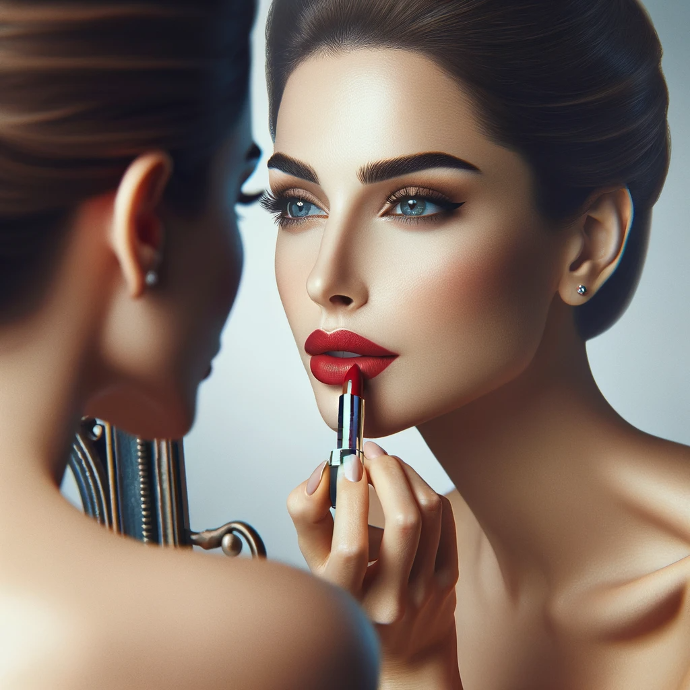Makeup, often relegated to the realm of aesthetic enhancement, is a profound tool for self-expression and personal identity. Its impact goes far beyond surface-level beauty, intertwining with psychological elements that shape how we view ourselves and how we choose to be seen by others. This deeper exploration uncovers the multifaceted nature of makeup, revealing that it is not just a mask, but a complex language of self-expression, confidence, and identity.

Makeup as a Language of Psychological Expression
Color Psychology in Makeup
The colors chosen in makeup can communicate a range of emotions and traits. For example, red lipstick is often associated with confidence, power, and sometimes, sexuality. A study by the Société Française de Cosmétologie found that women who wore red lipstick reported feeling more confident and empowered. Similarly, a testimonial from a New York-based makeup artist, Jane Doe, highlights that "Clients often choose red lipstick when they want to feel bold and assertive". On the other hand, softer tones like pinks and nudes can convey femininity, warmth, and approachability. The use of vibrant colors in eyeshadows, such as blues or greens, can express creativity and a playful spirit, while darker shades might suggest depth and introspection.
Eye Makeup: Windows to the Soul
Eye makeup, in particular, holds significant sway in expressing emotions and enhancing communication. A well-defined eyeliner can give a sense of sharpness and precision, suggesting a meticulous and determined personality. Mascara, by enhancing the lashes, draws attention to the eyes, often considered the windows to the soul, allowing for non-verbal communication to be more impactful.
Body Makeup: Beyond the Face
Makeup is not just limited to the face. Body makeup, like intricate henna designs, can represent cultural heritage and personal stories. Temporary tattoos created with makeup can be a form of experimentation with identity and self-expression, without the permanence of traditional tattoos.
The Therapeutic Aspect of Makeup
Makeup as a Ritual
The ritual of applying makeup can be a form of self-care and mindfulness. For many, this process is a time to disconnect from the outside world and focus inward. The act of blending eyeshadow or contouring the face can be meditative, providing a sense of calm and control.
Art Therapy Through Makeup
Art therapy often uses the medium of drawing or painting, but makeup can serve a similar purpose. Creating designs or experimenting with different looks can be a way to process emotions, cope with stress, or simply find joy in the act of creation.
Challenging the Notion of Makeup as a Mask
Enhancing Rather Than Hiding
Modern perspectives on makeup challenge the idea of it being a mask. Instead, it's seen as a tool to enhance natural beauty or to highlight aspects of one's personality. For instance, someone with a bold, adventurous personality might opt for dramatic makeup styles, which aligns with their inner self rather than hiding it.
Makeup's Role in Self-Perception and Confidence
Psychological Studies on Makeup
Nancy Etcoff's study at Harvard University, as mentioned earlier, found that makeup significantly affects how women are judged on these attributes, with results indicating that women wearing makeup were perceived as more competent and likable. However, the study also suggested that there can be a threshold effect, meaning that perceptions of trustworthiness might decline if makeup is overdone. The research highlights the nuanced role of makeup in social and professional perceptions and its potential impact on personal and career outcomes.
Makeup in Professional Settings
A survey from Forbes lends empirical weight to this narrative, indicating that a significant majority of female executives—64%, to be precise—feel that wearing makeup at work bolsters their confidence and enhances their professional demeanor. This statistic is not merely about vanity; it reflects the psychological armor that makeup provides, enabling women to navigate the corporate landscape with an additional layer of self-assurance.
As such, makeup in professional settings can be seen as a form of non-verbal communication—a language of self-presentation that is as nuanced as it is impactful. It is a tool that, when used judiciously, can subtly influence perceptions and dynamics in any professional interaction.
Final Reflections on the Power of Makeup
When we bring together real-life stories, research findings, and statistics, it's clear that makeup is more than just something we put on our face. It's a powerful way for people to show who they are, feel more confident, and shape their own story. Makeup is not just about looking good. It's a deep part of how we express ourselves and connect with others. It shows that the choices we make about our appearance can have a big impact on our inner feelings and how we fit into the world around us.
The Role of Makeup in Self-Expression: A Deeper Psychological Perspective